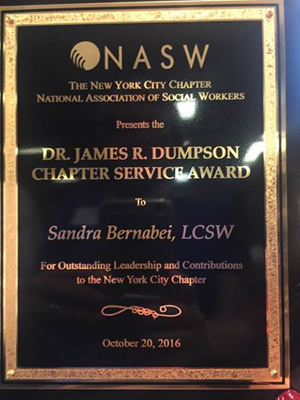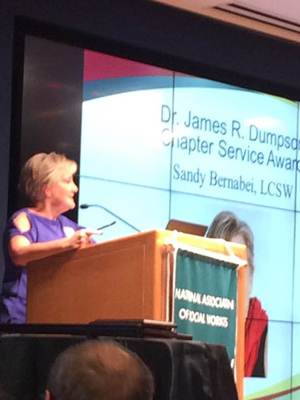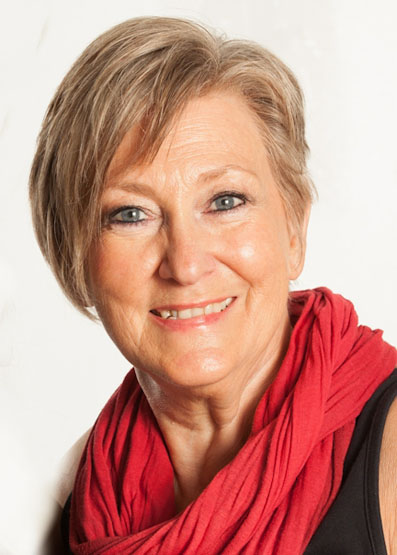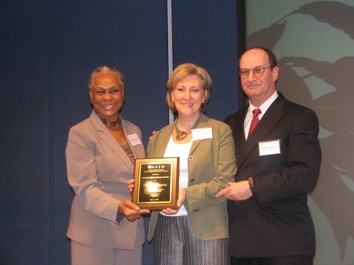On October 20, 2016 Sandy Bernabei received the Dr. James R. Dumpson Chapter Service Award for Outstanding Leadership and Contribution to the New York City Chapter.


Race Treaty discusses the implications of the convergence of CERD and Racial Equity competencies with the field of Social Work and beyond. The implications of CERD enactment into local Municipal Law. And as always, we will frame the discussion within the analysis of Systemic Racism/White Supremacy. Joining us in the analysis is Sandy Bernabei who is Director of Anti Racist Alliance, a Coalition in NYC that has brought the Peoples Institute Training to the Schools of Social Work at Columbia, Fordam and Hunter Colleges.
Candida Brooks and Sandra Bernabei * The Undoing Racism™ Internship Project (URIP), Founding Members; President and First Vice President of the Board of Directors
The National Association of Social Workers, NYC Chapter (NASW-NYC), founded the Undoing Racism™ Internship Project (URIP) to refocus social work education on areas of study that can help students break cycles of systemic racism that inhibit us as a society from building toward racial justice.
Formed in collaboration with the Anti-Racist Alliance, the People’s Institute for Survival and Beyond, Jewish Board of Family and Children’s Services (JBFCS), and New York area universities, two program advisors have been instrumental in helping the URIP to grow and progress: Board President Sandra Bernabei and First Vice President Candida Brooks.
“Social work and education have a history that is steeped in social justice and reform,” says Brooks. “In order to achieve positive outcomes for all and to affect change, we must be flexible in our ability to synthesize different lived experiences, and keen in our analysis of the impact of inter-connected systems.”
“Our election in 2012, as a team, to the Board of Directors of NASW-NYC lifted up the work of so many we have been organizing with for so long,” says Bernabei. “Social work has many voices and areas of practice to build upon in collaboration.”
“Women can accomplish much when they work together,” she added. “Start by identifying the work that is meaningful to you; then, invest fully, join or create a collective, and find innovative ways carry the work forward.”
On the Person Who Has Had The Most Profound Influence In My Life
Sandra Bernabei: Ron Chisom, Executive Director of The People’s Institute for Survival and Beyond is my mentor. He has inspired me to believe that each one of us has a role in and responsibility for undoing racism in our lifetime.
Candida Brooks: I was fortunate to be born into a family of activists during the ’60s, but it was my mother who taught me about social systems. She was the most intelligent woman I have ever known, yet she only obtained a sixth-grade formal education. This notwithstanding, she instilled the notion that education is the great equalizer and demonstrated how to move within a society that institutionalizes roadblocks. My family is and continues to be my first collective.
On the Hardest Challenge I’ve Had to Face in My Career
Sandra Bernabei: To not sell out my values for personal advancement.
Candida Brooks: Coming to a crossroad that emerged from a crisis situation allowed me the opportunity to make one of the boldest moves of my equity work and career. In that moment, I truly realized that as challenging it can be, the decision-making power was mine to keep or to give away. You must understand that you have power—power in the most challenging situations and power to decide.
The practice of social work focuses on more than day-to-day patient assessment. Today’s social workers are advocates, community developers, and human rights activists. The social work profession is committed to social justice. Social workers fight for oppressed communities and marginalized individuals, often forgotten about by society.
This list is comprised of the 30 most influential social workers alive today. Selection was based on merit, scholastic study, and political activism. From celebrities to university professors, the list includes individuals who plan, engage, and support social work. Many belong to professional associations that provide ethical guidance and support to various communities. Most have authored books or published journal articles on policy, reform, crisis intervention, and civil liberties.
Of the most influential social workers selected, all advocate for those affected by social disadvantage, such as poverty, abuse, illness, disability, or social injustice. They are experts in the field and instigate awareness within the social work field.

Sandra Bernabei is the New York City area community organizer and president of the National Association of Social Workers. She is a private practitioner who works as a liberation psychotherapist and life coach, with fieldwork in the areas of depression, anxiety, and addictions. Bernabei is a founding member of the Antiracist Alliance and has served as a director at Barnard College and Columbia University. She is a recipient of the WestCOP Community Service Award and advocate for obtaining resources for low-income families and at-risk populations..
Full Article
Lisa V. Blitz, PhD, LCSW-r, Assistant Professor, Binghamton University Department of Social Work, lblitz@binghamton.edu; Mary Pender Greene, LCSW-r, Organizational Consultant, private practice, Co-Founder, AntiRacist Alliance, mlpenderg@gmail.com; Sandy Bernabei, LCSW, private practice, Co-Founder, AntiRacist Alliance, sandy.bernabei@gmail.com
To be published in:
Stories from the Field: Voices of Social Change:
Socially Just Generalist Practice: Putting Theory into Action
A book on anti-oppressive social justice work edited by: Karen Morgaine, Ph.D. and Moshoula Capous-Desyllas, Ph.D., M.S.W. California State University - Northridge Sociology Department
January 11, 2008
Rockland drug court has new graduates, marks 10th year
Suzan Clarke, The Journal News
The graduates were older, younger, male and female, white and black, middle class and working class. But they had one thing in common: They got into trouble with the law because of drug addiction.
Yesterday, the seven graduated from Rockland County Drug Court before scores of people gathered in the county Legislature's chambers. Some graduates spoke only a few words, and others cried, but all expressed profound gratitude and enormous hope for their future.
The program, which provides substance-abuse treatment, rather than jail, for people who plead guilty to nonviolent crimes due to alcohol or drug addiction, is marking its 10th year.Drug Court participants must complete stringent requirements that allow them to have their convictions dropped after six months of good behavior.
Including yesterday's graduates, 144 people have successfully completed the program since its inception. George Adaime, 27, of Stony Point made people laugh and cry when he talked about his three years in the program.He told his fellow graduates to never give up on their sobriety, saying he came "this close" to quitting several times during the program."Finally, I just gave in, and, trust me, it's a much better life. I got everything I ever wanted. When I was out there using, I couldn't say that. It was paycheck to paycheck. And by the time I got my paycheck, half of it was already owed out to the drug dealers. I was running from the cops, worried about getting pulled over all the time, looking over my shoulder all the time. "Now I walk around with my head up high, and I walk around without a care in the world because I know I'm clean," Adaime said, finishing to rousing applause from the audience.
Karen M. Carpenter-Palumbo, commissioner of the state Office of Alcoholism and Substance Abuse, said in her keynote address that 2.5 million New Yorkers have had an addiction."Fifty percent of the kids in your state had a drink last night - seventh-graders, eighth-graders, ninth-graders. We can't forget that," she said. Carpenter-Palumbo urged the graduates to celebrate their sobriety in the same way that cancer patients do their continued survival, telling them to reach out for assistance if they felt overwhelmed, and, if they felt able, to talk about their experiences so someone else could be helped.
County Judge Charles Apotheker, the program's judge, said he initially opposed the concept. Apotheker, who presided over yesterday's ceremony, said the court had made a believer out of him.
The program started in 1998 under then-District Attorney Michael Bongiorno. Two of the people involved in the start-up, then-Executive District Attorney Beth Finkelstein and Sandra Bernabei, who was executive director of the Rockland Council on Alcoholism and Other Drug Dependence, were presented with news for their work with the program.
"Recovery is transformative - and not just for you, but it's transformative for all of us," Bernabei told the graduates, adding that they were lucky to have been allowed to participate.
"There are thousands and thousands and thousands of people who are being warehoused in upstate New York prisons because of the Rockefeller drug laws," she said, referring to mandatory sentencing laws that are considered among the country's harshest. "We will not be fully humanized until we see all people, especially nonviolent first offenders, with their humanity and offer treatment instead of incarceration."
During the event, local and state elected officials congratulated the graduates and shared their thoughts about the program's success.
A choir consisting of clients from St. Christopher's Inn, a substance-abuse treatment center in Garrison, sang two songs. James Rohrig watched his daughter, Stephanie, 19, graduate."It was very uplifting to see the little steps. There were no giant steps. It was like a series of mini-accomplishments, and today we're very happy," the West Nyack man said. "The whole family is here - her mom and dad and her siblings - and we're all sharing in her success." Someone else came out to see Stephanie Rohrig graduate.
Ramapo Police Officer John Salmon stood in the back of the room and watched while Rohrig took the podium and thanked him for having arrested her in 2005."It was just something that just started what needed to be started," she said after the ceremony.Salmon said the event made him feel he had made a difference. "I was a (New York) city cop, and I've seen a lot of people hit rock bottom and never get back," he said.
"This is definitely a great start and ... now I just wish her the best."

NASW NYC - 2008 Social Work Image Award
Megan McLaughlin, Sandy Bernabei, Bob Schachter